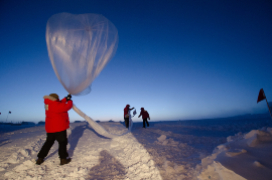Bachelor of Science in Climate Science (Bachelors)
UCLA
Los Angeles, CA
Climate change is one of the most pressing issues facing this generation. Students trained in the scientific basis for climate change and estimates of climate risk will form part of the solution. The Department of Atmospheric & Oceanic Sciences’ Climate Science major will provide students with the scientific understanding they need to assess climate impacts from both human-induced climate change and natural climate variability, as well as find solutions to manage and mitigate them. It will also provide an understanding of the climate system needed to communicate climate information to decision-makers in the public sector, private sector, and non-governmental organizations
What does the new Climate Science degree program consist of?
The major is composed of science courses plus requirements from related fields:
All the basic math and science requirements expected of all science majors, including calculus, introductory physics, and introductory chemistry. Students will complete the major with quantitative thinking skills comparable to other science majors. Students will also be required to take one course in statistics and one in computer programming. The core and advanced Climate Science courses can only be completed successfully with this background.
Seven core climate science courses. The core climate science courses will teach the fundamentals of climate science, including the phenomenology of the climate system, energy flows within the climate system, the dynamics and thermodynamics of the atmosphere and ocean, biogeochemistry, and the state of knowledge of climate change. Coursework will place heavy emphasis on solving the big data problems common to Climate Science with computer programming techniques so that the students graduate from the program with this highly transferrable skill.
Two upper-division courses outside the AOS department. Because climate science is relevant for public policymaking, and because changes in the physical climate system are profoundly influenced by human choices, students will be encouraged to engage in coursework on relevant policy issues. In addition, they will be encouraged to engage in advanced coursework in an area of quantitative reasoning particularly relevant to climate science. Because these courses will be taken toward the end of the students’ time at UCLA, likely during the 4th year of study, this portion of the curriculum is designed so that students can tailor it to their own post-graduation objectives. The AOS department will maintain a list of pre-approved UCLA policy/solutions and quantitative courses relevant to Climate Science from which the students can choose.
Learning Outcomes
1. Demonstrated mastery of the basic principles and tools of science
2. Demonstrated fundamental understanding of the atmospheric and oceanic sciences
3. Demonstrated analytical and mathematical skills through the application of learned concepts and tools in solving relevant theoretical, computational, and empirical problems
4. Ability to apply knowledge gained to independently identify, analyze, and understand real-world problems and issues
5. Demonstrated effective oral and written communication of results and conclusions
6. Understanding of the societal and policy context of climate science








